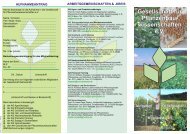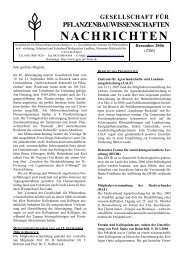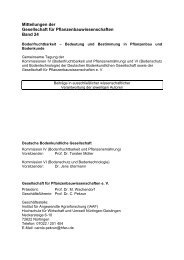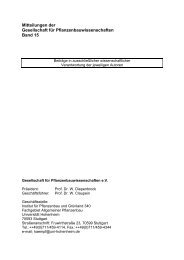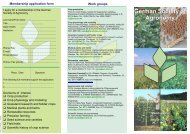Mitteilungen der Gesellschaft für Pflanzenbauwissenschaften Band 23
Mitteilungen der Gesellschaft für Pflanzenbauwissenschaften Band 23
Mitteilungen der Gesellschaft für Pflanzenbauwissenschaften Band 23
Sie wollen auch ein ePaper? Erhöhen Sie die Reichweite Ihrer Titel.
YUMPU macht aus Druck-PDFs automatisch weboptimierte ePaper, die Google liebt.
Mitt. Ges. Pflanzenbauwiss. <strong>23</strong>: 191 (2011)<br />
Are non-methylated uronic acids involved in limiting extension<br />
growth of maize shoot in the first phase of salt stress?<br />
Nesar Uddin, Ruben Leubner, Philipp Eitenmüller, Stefan Hanstein and<br />
Sven Schubert<br />
Institute of Plant Nutrition, Universität Gießen. E-Mail: mnesar_bau@yahoo.com<br />
Introduction<br />
The carboxyl groups in pectins are highly esterified with methyl groups during<br />
biosynthesis in the golgi and are deesterified later, as the cells ceasing growth, due<br />
to the action of pectin methylesterases. De-esterified pectins form stiff gels through<br />
Ca 2+ -mediated cross-linking of carboxyl groups through ionic and coordinate bonds<br />
(Cosgrove, 2005). Changes in pectins and methylesterification of pectins in cell walls<br />
of different maize genotypes in the first phase of salt stress may explain their<br />
differential inhibition of growth.<br />
Results and Discussion<br />
In or<strong>der</strong> to investigate the changes of non-methylated pectin concentrations in cellwall<br />
as affected by salt stress, three maize genotypes namely Pioneer 3906, SR 12<br />
and SR 03 were cultivated in 1 mM (control) and 100 mM NaCl. Pectin and<br />
methylesterification of pectin were determined colorimetrically. The concentrations of<br />
non-methylated uronic acids were increased in young growing shoot cell-wall of<br />
Pioneer 3906 and SR 12 but decreased in SR 03. However, studies with the<br />
youngest and younger shoot cell-wall of SR 12 and Pioneer 3906 revealed that the<br />
relative increase of non-methylated uronic acid concentration is delayed in SR 12<br />
compared to Pioneer 3906, which perhaps favored SR 12 to grow relatively better<br />
than Pioneer 3906 un<strong>der</strong> salt stress. Previous studies revealed that only SR 03 can<br />
maintain proton pump-mediated acidification of apoplast while SR 12 and Pioneer<br />
3906 cannot maintain wall acidification un<strong>der</strong> salt stress (Pitann et al., 2009; Hatzig<br />
et al., 2010). This suggests that increasing concentrations of non-methylated uronic<br />
acids may be involved in decreasing shoot elongation by forming Ca-pectate and<br />
other types of wall cross-links in cv. Pioneer 3906 and SR 12. However, the growth<br />
inhibition in SR 03 might come from other types of cross-links rather than nonmethylated<br />
uronic acid in the first phase of salt stress.<br />
References<br />
Cosgrove, D.J. 2005. Growth of the plant cell wall. Nat. Rev. Mol. Cell. Biol. 6(11):850-861.<br />
Hatzig, S., Hanstein, S., Schubert, S. 2010. Apoplast acidification is not a necessary determinant for<br />
the resistance of maize in the first phase of salt stress. J. Plant Nutr. Soil Sci. 173:559-562.<br />
Pitann, B., Schubert, S., Mühling, K. H. 2009. Decline in leaf growth un<strong>der</strong> salt stress is due to an<br />
inhibition of H + -pumping activity and increase in apoplastic pH of maize leaves. J. Plant Nutr. Soil<br />
Sci. 172:535-543.



